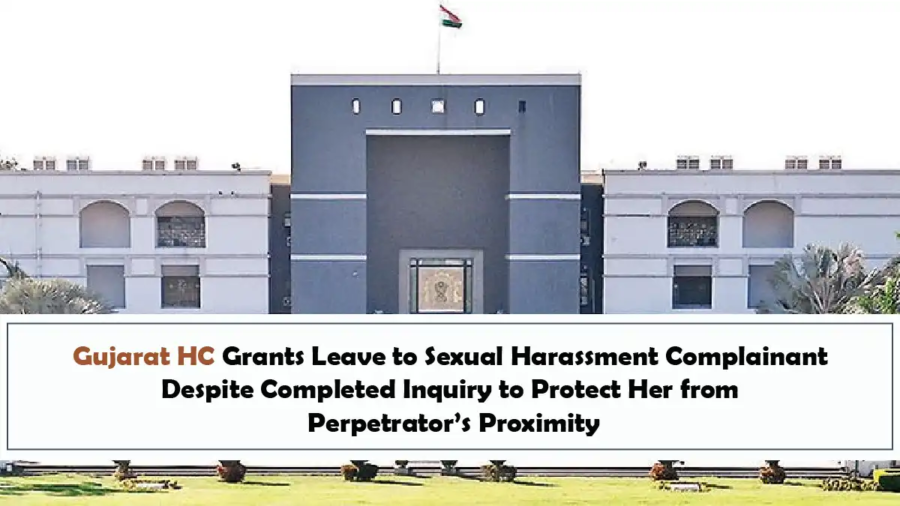Gujarat HC Grants Leave to Sexual Harassment Complainant Despite Completed Inquiry to Protect Her from Perpetrator’s Proximity
Facts of the Case
A woman government employee in Gujarat filed a complaint of sexual harassment against a colleague under the Sexual Harassment of Women at Workplace (Prevention, Prohibition and Redressal) Act, 2013 (POSH Act). Following the complaint, an inquiry was conducted, and the internal complaints committee (ICC) submitted its report. The accused was penalized by the department. However, the complainant remained in a situation where the accused colleague was still seated next to her at the workplace. The complainant filed a representation seeking either her own transfer or that of the accused to avoid proximity with the alleged harasser. Meanwhile, the inquiry was completed, and the accused was punished, but the complainant’s request for transfer was yet to be decided by the concerned authority.
Contention of the Complainant
The complainant’s counsel argued that despite the inquiry’s completion and punishment imposed on the accused, the complainant could not be compelled to continue working next to the perpetrator. She sought relief in the form of transfer from the workplace or alternatively leave, relying on Section 12 of the POSH Act. The counsel stressed that the complainant was currently forced to work next to the accused, causing distress and affecting her ability to function. She had also been threatened with a notice for being on unauthorized leave, although the leave was sought on genuine grounds of harassment and safety concerns. The counsel relied on Section 12, which permits the complainant to be granted leave or transfer during the pendency of inquiry, arguing that even post-inquiry, the complainant’s welfare needed protection.
Contention of the Respondent
The respondent’s counsel acknowledged that the department had taken cognizance of the complaint, conducted an inquiry, and imposed a penalty on the accused. He contended that since the inquiry was concluded and punishment awarded, the complainant could not dictate the terms of her posting or demand transfer. The department maintained that the matter should be considered closed, and the complainant’s demand for transfer or leave was no longer tenable as per the strict reading of Section 12 of the POSH Act, which applies during the inquiry period.
Court’s Observations
The Court recognized the tension between the legal provisions and the ground realities faced by the complainant. It observed that while Section 12 of the POSH Act typically applies during the pendency of the inquiry, in the present circumstances where the accused was still physically present next to the complainant, it would be unjust to compel her to work in such conditions.
The Court stated: “Even if inquiry is concluded the facts remain… it is very difficult that law does not serve its purpose. Because if I have to sit next to perpetrator who has committed harassment against me then I can never function.”
Further, the Court instructed the concerned authority to consider the complainant’s representation sympathetically within a week. Meanwhile, it granted the complainant leave for one week “in addition to the leaves that she is otherwise entitled to” to relieve her from the immediate distress.
The Court explained the legislative intent behind Section 12: “In line of the legislative mandate i.e. broadly in line of legislative intent for framing Section 12 of the Sexual Harassment of Women at Workplace (Prevention, Prohibition and Redressal) Act, 2013, leave may be granted…” The Court thus extended the protective purpose of the provision beyond the strict procedural scope of the inquiry’s pendency.
In a candid oral remark, the Court suggested that “At least the two of them should not be posted to the same place,” emphasizing the necessity of practical solutions to avoid forcing the victim to share a workspace with the accused.
Court’s Order
The Gujarat High Court granted the complainant leave for one week, in addition to her other entitled leaves, to be effective immediately while her pending representation seeking transfer was considered sympathetically by the concerned authority within one week. The Court adjourned the matter for further hearing on June 12, 2025, directing the authorities to expedite the decision. The leave was granted notwithstanding the completion of the inquiry, reflecting the Court’s concern for the complainant’s work environment and well-being.
Credits: Adv. Deeksha Rai


